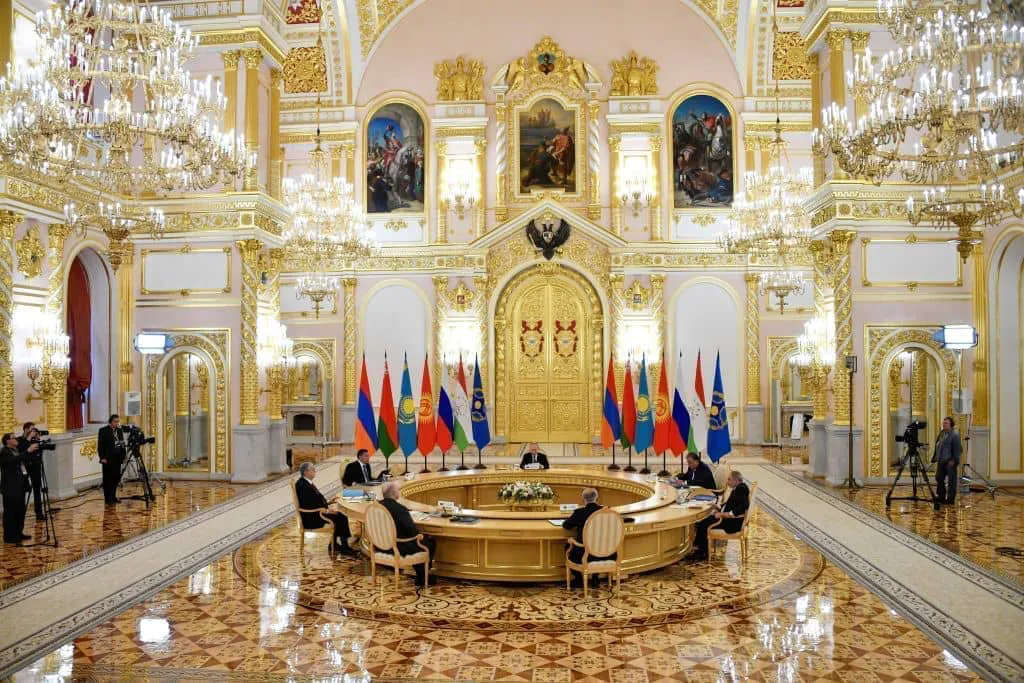26 June 2022, 8:00am
On 25 February 2022, the day after Russia invaded Ukraine, a select group of oligarchs attended a private meeting with President Putin in the Kremlin’s St. Catherine’s Hall. It was ostensibly to discuss how the government would assist state-owned Russian banks who were about to be sanctioned by the USA, notably Sberbank and VTB Group. The deputy prime minister Andrey Belousov asked the oligarchs and corporate titans to keep working with sanctioned banks. He said that confidence in the banks was crucial for a country where historically financial chaos has destroyed savings and people’s livelihoods.
Among those present was a Russian billionaire called Dmitry Mazepin, best known in the UK for sponsoring the Formula One Haas team of which his son Nikita was a star driver. Mazepin sat among other powerful wealthy billionaires, notably Gazprom’s Alexey Miller, and Rosneft’s Igor Sechin. And he soon realised that it was not just the banks who would be sanctioned. The oligarchs would be next. And he was right. Two weeks later, on 9 March, Mazepin was sanctioned by the EU and soon his assets were frozen by the UK, Canada and Switzerland.
The sanctioning of Putin’s Kleptocrats who have funded his war machine is well documented. But what is less well known are their secretive steps to circumvent the sanctions by concealing and transferring the ownership of their companies to close relatives and business associates and hence sidestepping the impact of the asset freezes. And the regulators appear to have missed that they are adept at exploiting legal loopholes.
Just days after being sanctioned, Mazepin sold his controlling stake in his giant fertiliser company Uralchem and transferred ownership to his longtime associates and fellow directors, Dmitry Tatyanin and Dmitry Konyaev. The three had been business partners since 2007 when Uralchem was established and were inextricably linked. Tatyanin, head of legal affairs, became the 48 per cent owner of Basic Chemical Uralchem and Konyaev, former commercial director, received 4 per cent of the shares.
By 21 March, the billionaire Mazepin was no longer majority owner of the company and had relinquished management positions in Uralchem, which owns Uralkali, the world’s largest potash producer. The ownership structure of his two fertiliser terminals in Riga, Latvia, was also swiftly changed. Suddenly a Swiss company called Svizraa was the co-owner of the terminals and the new principal beneficial owner was an individual called Bhidwal Aamer Atta whose nationality is not named on the corporate filings.
By transferring ownership to his two closest business partners, the punitive effect on Mazepin for his pro-Putin allegiance appears to be limited. For other sanctioned billionaires, they simply keep their assets in the family. Former banker Andrey Melnichenko, worth an estimated $16 billion based on his fertiliser company EuroChem and coal producer SUEK, was sanctioned by Switzerland on 16 March 2022. On 8 March he resigned as a beneficiary of a trust in Cyprus which held his 90 per cent stake in EuroChem, worth billions of dollars. The new beneficiary of this trust was close to home – it was Melnichenko’s wife Aleksandra, a Serbian former model and pop singer. The next day the Russian multi-billionaire was sanctioned by the EU and the following week by the UK.
Surprisingly, EuroChem then heard from the Swiss government after its regulatory unit responsible for monitoring the sanctions against Russia was informed about the new ownership structure. The Swiss agency (SECO) placed its seal of approval: ‘Ms Aleksandra Melnichenko is the beneficial owner of the trust’, SECO reportedly wrote to a Zurich law firm. In doing so, SECO was ‘happily confirming’ that it had ‘no factual conclusive evidence’ that Eurochem is ‘owned or controlled by a sanctioned person.’ As a result EuroChem was not a sanctioned company and its accounts and payments were unblocked.
But earlier this month the EU woke up and realised that the Melnichenkos appeared to be receiving favourable treatment. On 3 June, it sanctioned the billionaire’s wife. ‘Aleksandra Melnichenko takes good advantage of the fortune and benefits from the wealth of her husband’, stated the EU. ‘Together with him, she owns two penthouses with a value of more than $30 million.’ And a week later Switzerland joined in by blacklisting Mrs Melnichenko and also insisted that EuroChem must provide proof that it is complying with sanctions imposed on its unlikely new beneficial owner. But crucially it did not appear to provide a timeline for how long EuroChem would be given to provide such evidence.
Alexey Mordashev, worth an estimated $21.2 billion based on his ownership of Severstal, Russia’s largest steel and mining company, also transferred assets worth billions of pounds to his wife. On 28 February, four days after the invasion of Ukraine, Mordashev was sanctioned by the EU and later by the UK, USA and Switzerland. But corporate filings in the UK show that in March the pro-Putin billionaire quietly transferred a $1.1 billion shareholding in his company Nordgold to his wife, Marina Mordashev. He also moved most of his ownership stake in the tourism conglomerate TUI to a Caribbean offshore company called Ondero Ltd which is also controlled by his wife, Marina.
These oligarchs have not broken any laws, but transferring ownership to a close relative or nominee runs perilously close to the legal edge of the cliff. One risky area relates to the control of an asset, especially after a sanctioned oligarch has sold his ownership. ‘A designated person may retain control over the company after divestment, even without having formal voting rights or the right to appoint directors’, said Robert Dalling, the leading sanctions lawyer and a partner in Jenner and Block. ‘He may install nominees or proxy owners who will act in accordance with his wishes. In those circumstances, the company itself is treated as subject to sanctions. As a result, it is unlawful for other companies to do business with it.’
‘It is therefore very important that businesses look into whether companies formerly owned by sanctioned persons may still in fact be controlled by them. If they are, the relationship may need to be terminated.’
All three oligarchs – Mazepin, Melnichenko and Mordashev – are furious about being sanctioned and have filed lawsuits at the EU Court of Justice to reverse what they regard as punitive measures. They argue that it is unfair to blame them for Putin’s war and there is ‘no justification whatsoever’ for being sanctioned. Melnichenko even denies being an oligarch and argues that he ‘had no relation to the tragic events in Ukraine’, ‘no political affiliations’ and ‘to draw a parallel between attending a meeting through membership of a business council and undermining or threatening a country is absurd.’
And yet despite their protests, these oligarchs have found ways to, in effect, evade sanctions and transfer their wealth and assets to a close relative or trusted associate. The sanctions might hurt Putin’s kleptocrats on the surface but in the secret world of asset ownership, the oligarchs often find a way.






